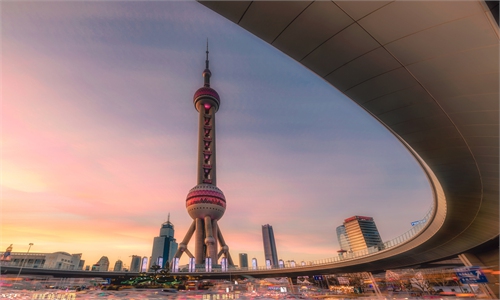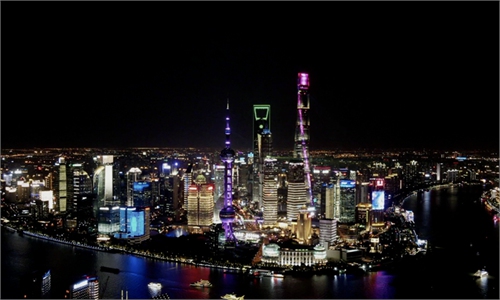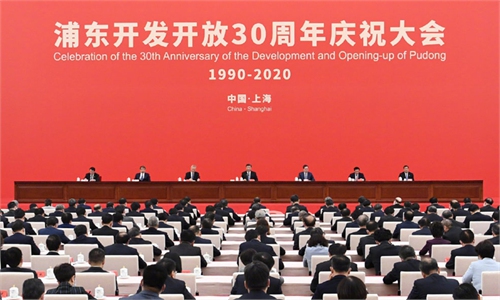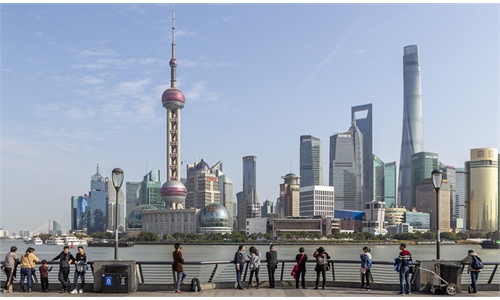China’s Pudong records meteor rise
Foreign companies impressed with region’s bold reform policy
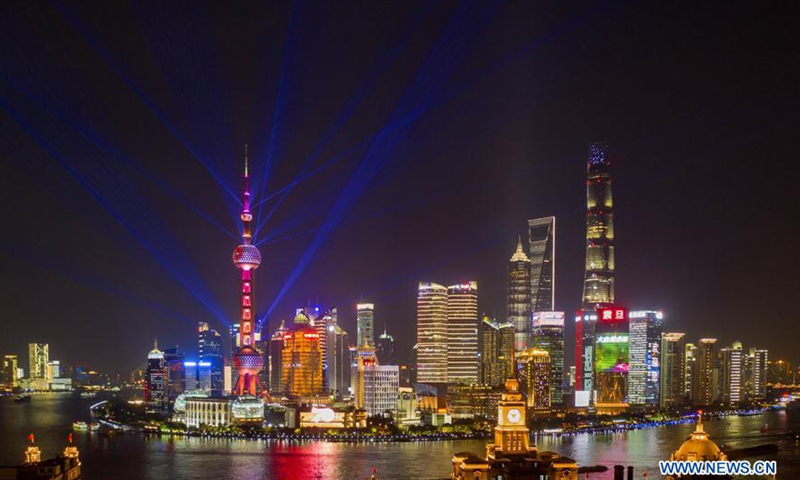
Aerial photo taken on Sept. 26, 2019 shows a light show at Lujiazui area in Pudong District of east China's Shanghai.Photo:Xinhua
As China celebrates the 30th anniversary of the Pudong New Area in Shanghai, a showcase of the country's meteor economic rise , multinational companies are recalling their success stories in the farmland-turned-wonderland, thumbing up its reform and opening-up initiatives.
China announced the development and opening-up of Pudong in 1990. Over the past 30 years, the new area has attracted 35,000 foreign-funded enterprises from 168 countries and regions, receiving foreign investment of $95.86 billion, official data showed. Pudong has become an epitome of China's connection with the world.
Entering China in 1997, French cosmetics firm L'Oreal has now established a 20,000-square-meter research and innovation center in Pudong that gathers hundreds of high-end researchers from more than 10 countries and regions. The company said a series of innovation policies and rich talent resource gave a boost to L'Oreal's fast development in China.
The Shanghai Pudong New Area launched a new registration policy in March 2017 to greatly shorten waiting time for approvals of imported cosmetics to five working days from around three months. L'Oreal was one of the first companies to benefit from the new policy, under which almost one new product hits the Chinese market each day.
Since the opening of the China (Shanghai) Pilot Free Trade Zone in Pudong in September 2013, numerous reforms and innovations have been made in the area, for example, the country's first negative list and record-filing measures for foreign investment.
Thanks to business environment optimization and systemic innovation, as well as China's huge market potential, foreign companies didn't slow their investment pace in Pudong despite the global pandemic this year.
Pudong saw foreign investment of $4.69 billion in the first half of the year, up 11.1 percent year-on-year, while 12 regional headquarters were established by multinationals, taking the total to 344, official data showed.
German high-tech polymer materials maker Covestro recently upgraded its management regional headquarters in Pudong to a multi-functional regional headquarters that integrates investment, management, operations, and research and development (R&D) to serve its development in China - one of its largest markets, which generates 20 percent of the group's sales.
"As a witness, participant, and contributor to China's reform and opening-up, Covestro regards China as its home market and Shanghai as its home base," Holly Lei, president of Covestro China, told the Global Times.
During the COVID-19 epidemic, UK-based drug maker AstraZeneca received ample support from the local government of Pudong to offset the impact of the outbreak, said Leon Wang, executive vice president of AstraZeneca.
The government helped solve any problems with the work visas of the foreign employees in Shanghai, inspected the headquarters, and offered more general policies like targeted tax and fee cuts, Wang told the Global Times.
Amid the unprecedented external and internal challenges of a growing anti-globalization trend and unilateralism led by the Trump administration, as well as economic shocks brought on by the COVID-19 outbreak, Pudong made a choice to expand opening-up, embrace technological innovation and develop modern services industries.
While Pudong spearheads China's reform, its Lujiazui financial zone has witnessed the deepening of the country's financial reform and opening-up.
Park Pu, chairman and CEO of JPMorgan Securities (China) Co, told the Global Times that the group had earlier expected that China's easing of the shareholding limit by foreign firms from 49 percent to 51 percent could take three to five years, but the actual opening-up speed was beyond his expectations.
Recently, JPMorgan increased its stake in its joint venture in China, JPMorgan Securities (China) Co, to 71 percent, and it is on the way to become the first foreign-owned securities company.
Pudong Speed
It's a symbolic success for local officials in Pudong - the attraction of conglomerates like Disneyland and Tesla, two multibillion-dollar projects that also boost neighboring industrial clusters.
After local authorities made major breakthroughs in 2019 in terms of project approval by creating "Tesla speed", which is known for approving Tesla's Gigafactory in Pudong's Lingang area, they also set a new record with Sam's Club, the membership-only retail chain owned by Walmart. From signing the agreement to beginning construction, it only took 76 days, as local authorities simplified the approval process, including getting certificates from land management administrations.
Zhang Hao, a pioneer who took part in the construction and development of the Pudong New Area in the early 1990s, said he still remembered that he welcomed about 20 groups of potential investors in just one day, both domestic and foreign business representatives, who had an interest in investing in Pudong.
"I used to be in charge of theme park projects, and we failed to sign the Disneyland project after nine years of negotiation," he said, noting that he and his colleagues never stopped making efforts to get the deal done.
As part of the negotiations, Zhang and his team visited Disneyland theme parks in different countries, which was also the point when he learned about high-quality services, for example, the way of experiencing different entertainment facilities with "immersive feelings" and using technology to empower entertainment.
For many businessmen like Zhang, opening up to foreign businesses has also been a process of learning from the outside world. Today, Disneyland sees the Chinese market as a huge one with full growth potential. When some politicians express doubt about whether China would turn inward or even decouple with the outside world amid growing challenges, such close connections with the outside world "speak louder than words," according to some business representatives.
